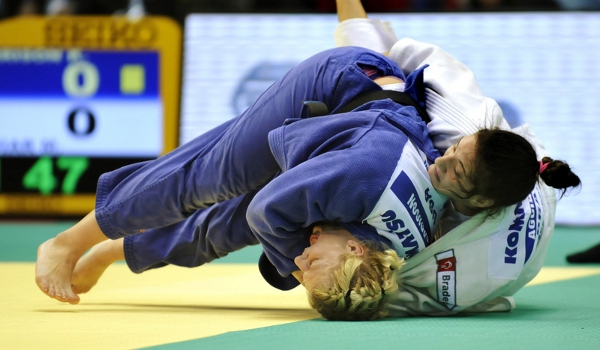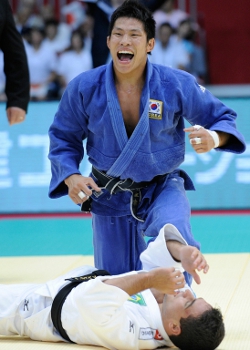Com três medalhas no último dia de disputa, seleção brasileira chega a 12 e supera marca total em edições anteriores dos Jogos Mundiais Militares
O judô conquistou mais três medalhas para o Brasil nos Jogos Mundiais Militares neste sábado, na Unifa, em Campo dos Afonsos. No último dia de disputa da modalidade, Luciano Corrêa (-100kg) conquistou o ouro, Maria Suellen Altheman (+78kg) levou a prata e Rafael Silva (+100kg) ficou com o bronze. A seleção brasileira terminou em primeiro lugar no quadro de medalhas da disciplina, com 12 medalhas no total, sendo cinco de ouro, quatro de prata e três de bronze. Em quatro edições anteriores somadas dos Jogos, o Brasil havia conquistado apenas seis medalhas.
Campeão mundial da categoria até 100kg em 2007, também no Rio de Janeiro, Luciano Corrêa voltou a ter sucesso na cidade. O brasiliense suou para passar pelas primeiras fases - superou o cazaquistanês Sabyrzhans Abildauly graças a três punições e o francês Thierry Fabre, medalha de bronze no Mundial de Tóquio-2010, por ippon no golden score. Derrotou ainda o chinês Zhang Kai e o polonês Kacper Larem antes de chegar à decisão contra o holandês Benjamin van Leeuwaarde.
Os dois passaram os primeiros minutos do combate se estudando e numa disputa intensa pela pegada. A cerca de dois minutos do fim, Van Leeuwaarde recebeu seu primeiro shido (punição) por entrada em falso. O segundo shido, que valeu yuko para Luciano, veio 40s depois, por falta de combatividade. O holandês partiu para o desespero e Luciano obteve um wazari em um contragolpe nos segundos finais. O adversário desistiu de tentar a virada e o brasileiro abriu os braços em comemoração.
Maria Suellen Altheman venceu por ippon todos os seus combates no Grupo 1 da categoria acima de 78kg para conquistar vaga na final contra a experiente francesa Anne Sophie Mondiere, cinco vezes campeã europeia e três vezes medalhista de bronze mundial. O combate foi truncado e Maria se defendia a cada tentativa de golpe da adversária. A 11s do fim, porém, Mondiere encaixou sua entrada e conseguiu o ippon. A torcida no ginásio da Unifa não ligou e gritou "Maria" repetidamente, aplaudindo a brasileira.
Rafael Silva começou muito bem sua campanha na categoria acima de 100kg, com triunfos sobre Kalum Fernando, do Sri Lanka, e Janusz Wojnarowicz, da Polônia. Nas semifinais, entretanto, perdeu um combate acirrado com o francês Pierre-Alexandre Robin, eventual campeão, por um wazari de diferença. Na disputa pelo bronze com Amine Mohamed Taib, da Argélia, "Baby" precisou de menos de um minuto para derrubar o adversário e obter um ippon quue valeu a medalha.
- Ainda estava irritado, meio engasgado com a derrota na semifinal e acabei descontando um pouco (risos). Tive que fazer uma preparação psicológica para entrar na disputa do terceiro lugar. Foi um resultado positivo, mas sei que ainda tenho o que melhorar para o Mundial de Paris - disse Rafael.
O Brasil não teve representantes na categoria até 78kg feminina - a titular Mayra Aguiar e a reserva Natália Bordignon foram ambas cortadas antes da competição. Daria Pogorzelec, da Polônia, derrotou a italiana Assunta Galeone para conquistar o ouro. A chinesa Chen Ying e a francesa Marie Moulin ficaram com as medalhas de bronze.
---------------------------------------------------------------------------------------
Brazil judo competition ends with record and first place medals
With three medals on the last race, the Brazilian team gets to 12 and exceeds total marks in previous editions of the World Military Games
Judo won three more medals for Brazil in the World Military Gameson Saturday at UNIFEM, in Field of Afonsos. On the final day ofcompetition of the sport, Luciano Correa (-100kg) won gold, MarySuellen Altheman (+78 kg) took the silver and Rafael Silva (+100kg) took the bronze. The Brazilian finished in first place in the medals table of the discipline, with a total of 12 medals, five gold, four silver and three bronze. In the four previous games combined, Brazil had won just six medals.
Champion of the category up to 100kg in 2007, also in Rio de Janeiro, Luciano Correa again had success in the city. Thebrasiliense sweat to pass through the early stages - has overtakencazaquistanês Sabyrzhans Abildauly thanks to three penalties and Frenchman Thierry Fabre, World bronze medal in the Tokyo-2010,by ippon in the golden score. Also defeated the Chinese and PolishZhang Kai Kacper Larem before reaching the decision against the Dutchman van Leeuwaarde Benjamin.
The two spent the first few minutes of fighting and is studying for anintense dogfight footprint. At about two minutes left, VanLeeuwaarde received his first shido (penalty) for entry into false.The second shido, which earned yuko for Luciano, came 40 seconds later for lack of combativeness. The Dutch went intodespair and Luciano got a wazari in a counter in the final seconds.The opponent has given up trying to turn Brazil and opened his arms in celebration.
Maria Suellen Altheman won by ippon all their matches in Group 1of the above 78kg category to win place in final against the experienced French Anne Sophie Mondiere, five times European champion and three times world bronze medalist. The match wastruncated and Mary defended the coup attempt of each opponent.The end of the 11s, however, Mondiere fit your entry and got theippon. The crowd in the gymnasium of Unifi not called and shouted, "Maria" over and over, cheering for Brazil.
Rafael Silva began his campaign in well over 100kg category, withtriumphs over Kalume Fernando of Sri Lanka, and JanuszWojnarowicz, Poland. In the semifinals, however, lost a bitter fightwith the Frenchman Pierre-Alexandre Robin, eventual champion, for a wazari difference. In the battle for bronze with AmineMohamed Taib, Algeria, "Baby" took less than a minute to knockthe opponent and get an ippon quue earned the medal.
- I was still angry, half choked with the defeat in the semifinal and finished minus a bit (laughs). I had to do a psychological preparation for entering the match for third place. It was a positive result, but I know I still have to improve for the World Cup Paris -Rafael said.
Brazil does not have representatives in the women's category up to78kg - the owner Mayra Aguiar Natalie Bordignon and reservewere both cut before the competition. Daria Pogorzelec, Poland, defeated Italy's Assunta Galeone to win the gold. China's ChenYing Marie Moulin and the French were left with bronze medals.

 O judoca Luciano Corrêa conquistou o ouro para o Brasil neste sábado (Foto: Photocamera/Divulgação)
O judoca Luciano Corrêa conquistou o ouro para o Brasil neste sábado (Foto: Photocamera/Divulgação) Rafael Silva com a medalha no peito após a final
Rafael Silva com a medalha no peito após a final Maria Suellen Altheman venceu todos os seus combates por ippon (Foto: Photocamera/Divulgação)
Maria Suellen Altheman venceu todos os seus combates por ippon (Foto: Photocamera/Divulgação)
